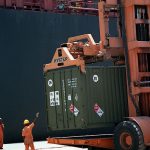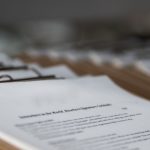Decoding OSRA: Section 14. Annual Report to Congress
Introduction
We’re still only beginning to see how the recent and ongoing changes to U.S. shipping law will affect businesses’ imports and exports as well as carriers’ and other industry stakeholders’ operations within maritime shipping. At Universal Cargo, we want to help shippers know how law changes will affect them. What exactly does the Ocean Shipping Reform Act (OSRA) say and do? This blog series goes through it section by section, so you can see exactly what our lawmakers changed in the U.S. Code dealing with shipping.

We’ll give you the OSRA text; the text of the U.S. Code, usually in Title 46, before and after its amendments; and consider what those changes mean for U.S. importers and exporters.
Previously covered in this series:
- Series Introduction & Quick Coverage of Section 1
- Section 2
- Section 3
- Section 4
- Section 5
- Section 6
- Section 7
- Section 8
- Section 9
- Section 10
- Section 11
- Section 12
- Section 13
Obviously, that means today we’re covering Section 14 of OSRA. Let’s see exactly what it says and changes…
Quick Overview
This section of OSRA doesn’t have a direct impact on shippers, but it could make a difference for them down the road. The section mandates the Federal Maritime Commission (FMC) reports on any concerning practices by ocean carriers, particularly those owned or controlled by foreign countries or corporations.
Thus, if ocean freight carriers are found acting in ways that are unfair to shippers, there could be laws created or changed in the future to address those practices. Of course, suspicious activities from carriers wouldn’t have to involve their interactions with shippers. I don’t want to go down the rabbit hole of potential ocean carrier activities or responses Congress could have to those practices because there are just too many hypotheticals.
Overall, Section 14 continues a theme in OSRA of increased scrutiny on ocean freight carriers.
Section 14 Text
SEC. 14. ANNUAL REPORT TO CONGRESS.
Section 46106(b) of title 46, United States Code, is amended--
(1) in paragraph (5), by striking ``and'' at the end;
(2) in paragraph (6), by striking the period and inserting
``; and''; and
(3) by adding at the end the following:
``(7) an identification of any otherwise concerning
practices by ocean common carriers, particularly such carriers
that are controlled carriers, that are--
``(A) State-owned or State-controlled enterprises;
or
``(B) owned or controlled by, a subsidiary of, or
otherwise related legally or financially (other than a
minority relationship or investment) to a corporation
based in a country--
``(i) identified as a nonmarket economy
country (as defined in section 771(18) of the
Tariff Act of 1930 (19 U.S.C. 1677(18))) as of the
date of enactment of this paragraph;
``(ii) identified by the United States Trade
Representative in the most recent report required
by section 182 of the Trade Act of 1974 (19 U.S.C.
2242) as a priority foreign country under
subsection (a)(2) of that section; or
``(iii) subject to monitoring by the United
States Trade Representative under section 306 of
the Trade Act of 1974 (19 U.S.C. 2416).''.
Original Title 46 Text
§46106. Annual report
(a) In General.—Not later than April 1 of each year, the Federal Maritime Commission shall submit a report to Congress. The report shall include the results of its investigations, a summary of its transactions, the purposes for which all of its expenditures were made, and any recommendations for legislation.
(b) Report on Foreign Laws and Practices.—The Commission shall include in its annual report to Congress—
(1) a list of the 20 foreign countries that generated the largest volume of oceanborne liner cargo for the most recent calendar year in bilateral trade with the United States;
(2) an analysis of conditions described in section 42302(a) of this title being investigated or found to exist in foreign countries;
(3) any actions being taken by the Commission to offset those conditions;
(4) any recommendations for additional legislation to offset those conditions;
(5) a list of petitions filed under section 42302(b) of this title that the Commission rejected and the reasons for each rejection; and
(6) an analysis of the impacts on competition for the purchase of certain covered services by alliances of ocean common carriers acting pursuant to an agreement under this part 1 between or among ocean common carriers, including a summary of actions, including corrective actions, taken by the Commission to promote such competition.
(c) Definition of Certain Covered Services.—In this section, the term "certain covered services" has the meaning given the term in section 40102.
Amended Text
§46106. Annual report
(a) In General.—Not later than April 1 of each year, the Federal Maritime Commission shall submit a report to Congress. The report shall include the results of its investigations, a summary of its transactions, the purposes for which all of its expenditures were made, and any recommendations for legislation.
(b) Report on Foreign Laws and Practices.—The Commission shall include in its annual report to Congress—
(1) a list of the 20 foreign countries that generated the largest volume of oceanborne liner cargo for the most recent calendar year in bilateral trade with the United States;
(2) an analysis of conditions described in section 42302(a) of this title being investigated or found to exist in foreign countries;
(3) any actions being taken by the Commission to offset those conditions;
(4) any recommendations for additional legislation to offset those conditions;
(5) a list of petitions filed under section 42302(b) of this title that the Commission rejected and the reasons for each rejection;
(6) an analysis of the impacts on competition for the purchase of certain covered services by alliances of ocean common carriers acting pursuant to an agreement under this part 1 between or among ocean common carriers, including a summary of actions, including corrective actions, taken by the Commission to promote such competition; and
(7) an identification of any otherwise concerning practices by ocean common carriers, particularly such carriers that are controlled carriers, that are--
(A) State-owned or State-controlled enterprises; or
(B) owned or controlled by, a subsidiary of, or otherwise related legally or financially (other than a minority relationship or investment) to a corporation based in a country--
(i) identified as a nonmarket economy country (as defined in section 771(18) of the Tariff Act of 1930 (19 U.S.C. 1677(18))) as of the date of enactment of this paragraph;
(ii) identified by the United States Trade Representative in the most recent report required by section 182 of the Trade Act of 1974 (19 U.S.C. 2242) as a priority foreign country under subsection (a)(2) of that section; or
(iii) subject to monitoring by the United States Trade Representative under section 306 of the Trade Act of 1974 (19 U.S.C. 2416).
(c) Definition of Certain Covered Services.—In this section, the term "certain covered services" has the meaning given the term in section 40102.
Observations on Section 14’s Paragraphs
Section 14 is a longer section than many of the sections we’ve recently gone through. However, that doesn’t mean there’s a whole lot more to it than most of those sections. The FMC already had an annual report the commission had to turn in to Congress. Section 14 adds one additional item to the list of things the 106th section of Title 46 requires the FMC include in that report.
Let’s quickly break down the three paragraphs of Section 14:
Paragraph (1) gets rids of the “and” at the end of the fifth item in the listed things the FMC is to include in its annual report to Congress. This indicates the list is about to get longer by at least one item.
Paragraph (2) lets us know that there is just one more item being added to the list, as it replaces the period with “; and” at the end of what was previously the last item on the list.
Paragraph (3) gets us to the real meat of the Section 13. This gives us the seventh thing the FMC must now include in its annual report. And it’s all about ocean freight carriers.
Observations on Inserted Text
The text of the new 7th item the FMC is to include in its annual report to Congress is a paragraph (7) with two subparagraphs (A and B), the second of which (B) is divided into three clauses (i, ii, and iii).
The paragraph is simple. If there are any carrier activities the FMC finds to be suspect or “concerning” that the commission isn’t already required to report, it is now to also report those.
Congress is particularly concerned with carriers that are owned or controlled by foreign countries or corporations. Thus, Congress emphasizes “controlled” carriers in the paragraph. Subparagraphs (A) and (B) then define what entities controlling carriers make those carriers of more particular concern.
Subparagraph (A) points to state owned or controlled carriers. Perhaps the most obvious example of this that comes to my mind is COSCO, the world’s fourth largest ocean freight carrier by capacity. This shipping giant is state-owned by China. It’s not surprising that the U.S. government would want to know about any of its concerning practices.
Subparagraph (B) adds ocean carriers controlled by foreign corporations to those of particular concern. The thing is none of the major ocean freight carriers are U.S. companies. This would seem to make concerning practices of every major ocean carrier of particular concern.
The clauses give more specifics to what countries those corporations being based in makes them of particular concern. These are countries the U.S. already has particular concerns with, are monitoring, or find to be nonmarket countries – which is to say the U.S. government finds they don’t have market principles of cost and pricing structure, leading to sales that do not reflect a product’s fair value.
Conclusion
Basically, Congress calls upon the FMC to be its watchdog on ocean freight carriers. If these companies are doing anything the FMC finds concerning, the commission is to report it to Congress.
Congress is especially concerned with ocean freight carriers that are controlled by foreign contries and corporations. But frankly, that’s pretty much all ocean freight carriers. Still, the countries that the U.S. already finds concerning are of particular interest when it comes to corporations based there. When an actual state controls an ocean freight carrier, Congress seems most concerned. But that is a bit of an assumption from the fact Congress made state-owned or -controlled explicit before being controlled by foreign corporations, which it diluted by specifying the type of countries those corporations being based creates the particular concern.
If you noticed something in Section 14 of OSRA that you think deserves more attention, please let us know in the comments section below. Perhaps you have a take on it that I didn’t consider. We’d love to hear from you.
Stay tuned for when Decoding OSRA continues, looking at Section 15….





